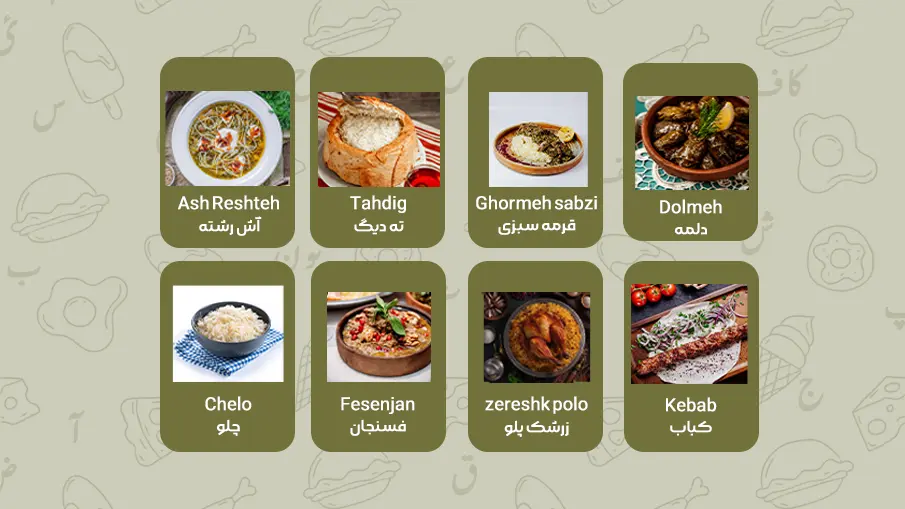Whether you want to learn conversational Farsi to confidently navigate Persian restaurants or deepen your connection to Persian culture, Danaa School’s expert tutors are here to guide you. Their flexible online classes make it easy to fit language learning into your schedule, no matter where you are. With Danaa School, you’ll gain the skills to speak Farsi, the cultural insights to truly appreciate Persian traditions, and a deeper understanding of Iranian heritage.
Dining out at a Persian restaurant is not just about enjoying delicious dishes like kebabs, saffron rice, and mouth-watering stews. It’s also an opportunity to immerse yourself in Persian culture, and what better way to enhance your experience than by learning Persian Vocabulary and Phrases for the Restaurant?
If you’re planning a trip to Iran or simply want to impress at your favorite Persian restaurant, this guide, along with the excellent lessons from Danaa School, will help you navigate the culinary world in Persian with ease. Let’s dive into the must-know phrases and words that will make your next dining experience much more authentic!
Learning Persian Restaurant Vocabulary
When you step into a Persian restaurant, knowing the basic vocabulary is essential to fully enjoying the experience. Farsi, the official language of Iran, has a beautiful cadence and structure, and mastering even simple restaurant phrases can make your dining adventure memorable. Below are some key Persian restaurant vocabulary words:
-
- Restaurant: رستوران (restoran)
-
- Menu: منو (menu)
-
- Table: میز (miz)
-
- Chair: صندلی (sandali)
-
- Waiter/Waitress: گارسون (garson)
-
- Food: غذا (ghazā)
-
- Drink: نوشیدنی (nushidani)
-
- Bill: صورتحساب (soorat-hesāb)
-
- Reservation: رزرو (rezerv)
-
- Delicious: خوشمزه (khoshmazeh)
These words will help you get familiar with the basics, but phrases are what get the conversation flowing.
Essential Phrases for Ordering at a Persian Restaurant
One of the most daunting tasks when in a foreign country or restaurant can be ordering food in a language you aren’t familiar with. Below are some Farsi phrases that will help you confidently place your order:
-
- Can I see the menu?: آیا می توانم منو را ببینم؟ (Āyā mitavānam menu rā bebinam?)
-
- What do you recommend?: چه چیزی پیشنهاد میکنید؟ (Che chizi pishnehād mikonid?)
-
- I would like to order…: می خواهم … سفارش بدهم (Mikhāham … sefāresh bedaham)
-
- Do you have vegetarian options?: آیا غذای گیاهی دارید؟ (Āyā ghazāy-e giyāhi dārid?)
-
- I am allergic to…: من به … حساسیت دارم (Man be … hassāsiyat dāram)
-
- How spicy is this?: این چقدر تند است؟ (In cheghadr tond ast?)
-
- Could I have some water, please?: ممکن است کمی آب داشته باشم؟ (Momken ast kami āb dāshté bāsham?)
Using these phrases will ensure that you are understood and respected by the staff, adding a layer of comfort to your dining experience.
Persian Dishes You Should Know

Iranian cuisine is diverse and flavorful. Whether you are new to Persian food or a seasoned fan, it’s helpful to know the names of popular dishes so you can order confidently.
-
- Kebab: کباب – A wide variety of grilled meats, often served with rice.
-
- Ghormeh Sabzi: قرمه سبزی – A famous Persian herb stew made with meat, kidney beans, and dried lime.
-
- Tahdig: ته دیگ – The crispy layer of rice at the bottom of the pot, considered a delicacy.
-
- Fesenjan: فسنجان – A rich pomegranate and walnut stew, often served with chicken or duck.
-
- Chelo: چلو – Persian rice served with butter and saffron.
-
- Dolmeh: دلمه – Stuffed grape leaves filled with rice and meat.
-
- Ash Reshteh: آش رشته – A hearty noodle soup made with beans, spinach, and herbs.
-
- Zereshk Polo: زرشک پلو – Rice served with barberries and often paired with chicken.
Understanding the names of popular dishes not only helps you with ordering but also enriches your dining experience by making you more knowledgeable about Persian cuisine.
Polite Expressions to Use at a Persian Restaurant
Politeness is key in Persian culture, and using polite expressions will endear you to the staff. Learning these will help you interact in a warm, respectful manner.
-
- Please: لطفاً (lotfan)
-
- Thank you: متشکرم (moteshakkeram)
-
- You’re welcome: خواهش میکنم (khāhesh mikonam)
-
- Excuse me: ببخشید (bebakhshid)
-
- I’m sorry: متاسفم (mote’āsefam)
-
- May I have…?: ممکن است … داشته باشم؟ (Momken ast … dāshté bāsham?)
By incorporating these phrases into your interactions, you’ll come across as both respectful and appreciative, which can make your dining experience more enjoyable and smooth.
Using Numbers and Money in Persian
When it’s time to pay the bill, knowing numbers and currency-related phrases in Persian can be quite useful. Here are some common terms and numbers you might encounter:
-
- One: یک (yek)
-
- Two: دو (do)
-
- Three: سه (seh)
-
- Ten: ده (dah)
-
- Twenty: بیست (bist)
-
- Fifty: پنجاه (panjāh)
-
- Hundred: صد (sad)
-
- How much does it cost?: قیمتش چقدر است؟ (Gheymatash cheghadr ast?)
-
- Can I pay with a card?: آیا میتوانم با کارت پرداخت کنم؟ (Āyā mitavānam bā kārt pardākht konam?)
-
- Do you accept cash?: آیا پول نقد قبول میکنید؟ (Āyā pool-e naqd ghabool mikonid?)
Understanding these phrases will allow you to navigate the payment process smoothly.
Dining Etiquette in Persian Culture
Iranian culture places great emphasis on hospitality and etiquette, especially when dining out. Here are a few cultural tips to keep in mind when visiting a Persian restaurant:
-
- Sharing is Caring: It’s common in Persian culture to order several dishes to share with the table. Don’t be surprised if your host orders for everyone!
-
- Compliments to the Chef: Complimenting the food is always appreciated. You can say “غذای شما عالی بود” (ghazā-ye shomā āli bood), meaning “Your food was excellent.”
-
- Don’t Rush: Meals are often long, leisurely affairs. Take your time to enjoy the company and the food.
-
- Tarof: This unique cultural concept involves polite offers and refusals. For instance, the waiter may insist you don’t pay for the meal (out of politeness), but you should always insist on paying.
These tips will help you blend in and better appreciate the social aspect of dining in Persian culture.
Learn Farsi with Danaa School
If immersing yourself in Persian cuisine and culture inspires you to go a step further, Danaa School offers an excellent opportunity to learn Farsi. Designed for learners of all ages and backgrounds, Danaa School provides personalized lessons that help you master the language in practical and engaging ways.
Whether you want to learn conversational Farsi to confidently navigate Persian restaurants or deepen your connection to Persian culture, Danaa School’s expert tutors are here to guide you. Their flexible online classes make it easy to fit language learning into your schedule, no matter where you are. With Danaa School, you’ll gain the skills to speak Farsi, the cultural insights to truly appreciate Persian traditions, and a deeper understanding of Iranian heritage.
Find Your Ideal Teacher
At Danaa School, you can choose your Farsi tutor from a selection of qualified and experienced teachers. Begin an exceptional journey into the world of Persian language!
Book Your Trial Lesson
FAQs
How do I ask for the bill in Persian?
You can ask for the bill by saying “صورتحساب لطفاً” (soorat-hesāb lotfan), which means “The bill, please.”
What is a polite way to thank the waiter in Persian?
You can say “متشکرم” (moteshakkeram) or “خیلی ممنون” (kheili mamnoon), both meaning “Thank you very much.”
How do I order water at a Persian restaurant?
Simply say “لطفاً آب” (lotfan āb), which means “Water, please.”
What are some must-try Persian dishes?
Some must-try Persian dishes include Ghormeh Sabzi, Fesenjan, and Kebab with rice (chelo kebab).
What does 'tarof' mean in Persian culture?
Tarof is a cultural practice of polite refusal and insistence, where both the guest and host go through a ritual of offering and refusing services or goods, often out of respect and courtesy.
How do I ask if a dish is spicy?
You can ask, “این چقدر تند است؟” (In cheghadr tond ast?), which means “How spicy is this?”
Persian Vocabulary and Phrases for the Restaurant
Learning Persian vocabulary and phrases for a restaurant setting can significantly enhance your cultural experience. Whether you’re a traveler, a language learner, or simply a lover of Persian cuisine, using the right words and phrases can make the difference between a basic meal and a memorable culinary adventure. You can use this guide on Essential Farsi Phrases for Travelers.
Start learning Farsi now.
Want to Learn Farsi at Danaa School?
Here are the best resources for you!









